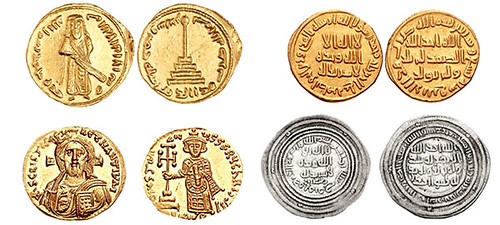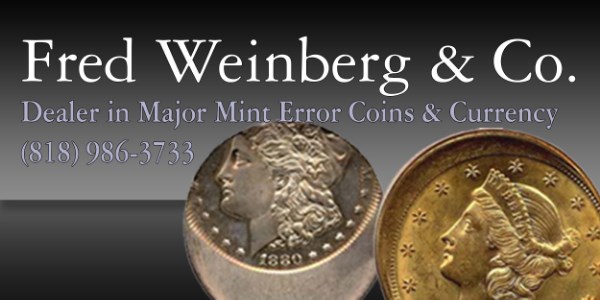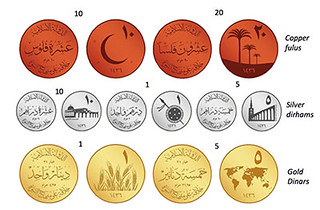
PREV ARTICLE
NEXT ARTICLE
FULL ISSUE
PREV FULL ISSUE
ISIS DINARS: THE GOLD OF DAESH
We've had several stories regarding the publicized coinage of the terrorist group ISIS (or ISIL). This article by Mike Markowitz
(published September 9, 2015 on Coinweek addresses some of the history of denominations such as the dinar. This helps answer some
of the questions raised last week by Chip Howell. Great article. Thanks! Here's an excerpt, but be sure to reach the complete version
online. -Editor
The coin designs were released onto the internet in November 2014: one and five gold dinars; one, five, and 10 silver dirhams; and 10 and 20 copper fulus. Clearly the work of a talented graphic illustrator and calligrapher, the designs were initially regarded by many experts (including this writer) as pure fantasy. But the new video shows gold pieces, at least, in low-rate production with fairly modern equipment–including a strip rolling mill, a blanking press and a small hydraulic coining press with steel dies. The hour-long video, narrated in English with Arabic subtitles and frequent chanted scriptural citations from the Qu’ran, is a professional production that employs a sophisticated documentary style. Much of the content is a propagandistic economic “history” of the modern world told from the point of view of a highly politicized Islamist ideology. Sharia law defines the dinar as a pure (24 karat) gold coin weighing “72 grains of barley” – about 4.44 grams. The dirham should be a coin of pure silver weighing about 3.1 grams. There is no explanation in the video for such inconsistencies, but pure gold and silver are too soft for coinage that must stand up to wear and tear from circulation. The Daesh coins, struck in low relief, would be particularly vulnerable to wear. Historically, coins of Islamic dynasties have varied widely in weight and purity. Presumably, when you declare yourself a Caliph, you can make your own rules. The Daesh video is insistent about the “intrinsic value” of precious metal coinage; this is a matter of religious faith for them (as it seems to be for many American gold enthusiasts). At current (7 September 2015) spot prices, the dinar would have a melt value of about US$134 and the dirham about US$0.90. Copper is not traded as a precious metal, but in the current market, the 10-fulus piece would be worth about US$0.06. Reportedly, a loaf of bread in Daesh-occupied Mosul costs about US$2. Some History

Constantine I (ruled 306-337 CE) introduced a new gold coin, the 4.5 gram solidus, which retained its purity for hundreds of years and became the standard for international trade. Around 692 the fifth Islamic caliph, Abd al-Malik ibn Marwan (ruled 685-705), issued his own gold coinage, because the Byzantine emperor had placed the image of Christ on his solidi (offending the Islamic prohibition of idolatry). Initially these gold dinars copied Byzantine prototypes, with a standing figure of the caliph replacing the standing figure of the Roman emperor. Then, in 697, Abd al-Malik introduced radically redesigned gold and silver coins with only Arabic inscriptions on both sides. This established the standard for Islamic coinage for centuries to come. Back to the Gold Standard?
I suspect that the facility shown in the video producing the coins is a small commercial jewelry factory, perhaps in Mosul, or the Daesh “capital” of Raqqa, equipped to make amulets, medallions and coin-like objects. Precious metal coinage is impractical in a modern economy for many reasons. Any precious metal coins put into circulation will rapidly disappear into hoarding, especially amid the civil war and chronic insecurity prevailing in Iraq and Syria. What is not hoarded is likely to flow out into neighboring countries in exchange for imports of food, manufactured goods or illegal services, like trafficking people across borders. Daesh gold may enjoy a brief premium over bullion melt value due to the novelty and notoriety. In some jurisdictions, trading in such coins could be viewed as material support for terrorism. Enterprising Turkish and Lebanese counterfeiting gangs can be expected to produce convincing plated base metal replicas for sale to the gullible. To read the complete article, see:
To read the earlier E-Sylum articles, see:

Wayne Homren, Editor The Numismatic Bibliomania Society is a non-profit organization promoting numismatic literature. See our web site at coinbooks.org. To submit items for publication in The E-Sylum, write to the Editor at this address: whomren@gmail.com To subscribe go to: https://my.binhost.com/lists/listinfo/esylum All Rights Reserved. NBS Home Page Contact the NBS webmaster 
|
